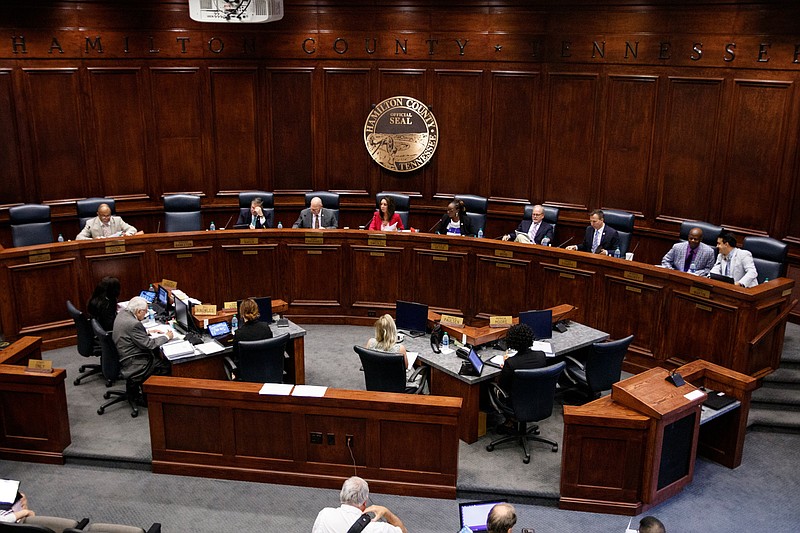It was a moment that came and went and may not come back again. But it wasn't Hamilton County Mayor Jim Coppinger's and the Hamilton County Commission's best moment.
The moment Wednesday was an opportunity for the mayor specifically and the county commission generally to offer support for the settlement of refugees in Hamilton County, where they have been settled with the help of local organizations for more than 40 years.
The difference for 2020 - at least until Wednesday - was that a presidential executive order required a state and "locality" to consent "to receive" refugees under the program. As the county mayor of the Hamilton County "locality," Coppinger's signature was thought to be required. But he hadn't signed.
Mayors of Knox, Shelby and Davidson counties in Tennessee, where along with Hamilton County refugees previously have been settled, had already signed their documents.
The signature was needed soon because the local resettlement agency, Bridge Refugee Services, had to report to the federal government whether the county would be accepting any refugees because of grant money that is attached to the resettlement to provide services and assistance.
When County Commissioner Warren Mackey brought up the issue at the end of Wednesday's meeting, neither he nor anyone else in the room likely knew the meeting would be extended another 81 minutes. But when it was all said and done, Coppinger had not agreed to sign the document, a commission resolution supporting the mayor if he signed the document did not pass, and Bridge Refugee Services was looking at missing its deadline next week for submission of paperwork about its resettling refugees in 2020.
Unbeknownst to those in the discussion at the Hamilton County Courthouse, at the same time, a federal judge in Maryland was issuing a decision blocking President Donald Trump's executive order that said individual states and localities had to sign off on the refugee program to receive refugees. In other words, for now, it doesn't matter whether the mayor signed the order.
What troubles us is Coppinger said he had previously met with Bridge officials and would have been able to ask any questions at that time to satisfy himself about any matter troubling him about the program or the process. Most of the commission members, to be fair, were hearing about the need for a local sign-off for the first time.
Still, the mayor and commissioners could have asked the Bridge associate director, its board chairman (an immigration attorney) and a longtime program supporter any questions they had at the commission meeting.
An eventual nonbinding resolution, proposed by Mackey, to give the mayor "cover" if he signed the document was favored by four commissioners (Republican Chester Bankston, and Democrats Katherlyn Geter, Mackey and David Sharpe), but three commissioners (Republicans Randy Fairbanks, Greg Martin and Sabrena Smedley) abstained. Two commissioners who heard most of the discussion (Republicans Chip Baker and Tim Boyd) left before the vote was taken.
Even though the resolution was nonbinding and did not commit them to anything, the three who abstained said they needed more information or needed to consult their constituents to make an informed decision.
Their reticence to vote for the resolution, like Coppinger's, was likely born because, as the mayor said, "you cannot overcome social media." In his initial remarks on the discussion, he said there was a lot of "misinformation" that was "being misrepresented in our community in a really bad way."
As we touched on in a recent editorial, the misinformation likely is that the refugees in question are illegal immigrants because many illegal immigrants who came to the country through Mexico last year misrepresented themselves as refugees.
Instead of dispersing throughout the country as illegal immigrants do, refugees - through a more than 40-year-old federal program for those who flee their country due to well-founded fears of persecution based on religion, political opinion, race, nationality or particular social group membership - are thoroughly vetted, arrive with paperwork on their backgrounds, are placed in specific areas where organizations can work with them, and are under some measure of control by the state because of the assistance they receive.
They are also limited in number, and will be more so this year because Trump has reduced the number of refugees that may be taken into the country annually from 90,000 to 18,000. Plus, unlike illegal immigrants from Mexico and Central American countries, the largest number of refugees resettled in Tennessee in 2019 came from Congo, Burma, Afghanistan and Burundi.
Wednesday's meeting could have been one for Coppinger to rise above the misinformation and - beyond acknowledging he knew refugees weren't illegal immigrants and that resettlement has been going on here for 40-plus years - say he would sign the document for the right humanitarian reasons.
He didn't and, for now, because of the blocked executive order, he doesn't have to.
